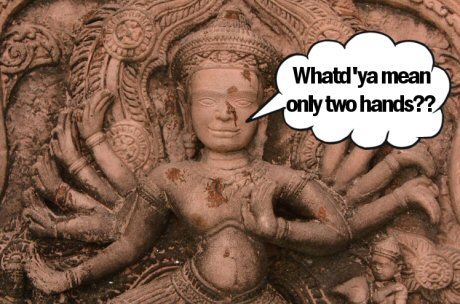19 August 2005
Intelligent Design Down Under
By Rusty Rockets
 You would think in this day and age that yet another creator driven explanation for life on Earth would barely rate a mention. However, the "theory" of Intelligent Design (ID) has managed to attract a truckload of attention by using a faux scientific veneer to infiltrate popular thought in a way that makes the Trojan horse look positively pedestrian. The final straw for many scientists came when "is our children learning" George Bush Jnr. suggested that ID should be taught in conjunction with evolution in the classroom. Since then, the thin edge of the wedge has been driven into the trunk of public consciousness to resonate with, not only creationists, but saps all over the world. It will probably come as no surprise that a country like the United States, swathed in Bible belt territories, would embrace an innovative creationist marketing device like ID to further their biblical cause. What may have come as a surprise is the introduction of ID into secular, mainstream Australia by none other than Federal Education Minister, Brendan Nelson. While he doesn't condone ID replacing evolutionary theory, he believes it acceptable for ID to be taught alongside the theory of evolution in Australian schools.
You would think in this day and age that yet another creator driven explanation for life on Earth would barely rate a mention. However, the "theory" of Intelligent Design (ID) has managed to attract a truckload of attention by using a faux scientific veneer to infiltrate popular thought in a way that makes the Trojan horse look positively pedestrian. The final straw for many scientists came when "is our children learning" George Bush Jnr. suggested that ID should be taught in conjunction with evolution in the classroom. Since then, the thin edge of the wedge has been driven into the trunk of public consciousness to resonate with, not only creationists, but saps all over the world. It will probably come as no surprise that a country like the United States, swathed in Bible belt territories, would embrace an innovative creationist marketing device like ID to further their biblical cause. What may have come as a surprise is the introduction of ID into secular, mainstream Australia by none other than Federal Education Minister, Brendan Nelson. While he doesn't condone ID replacing evolutionary theory, he believes it acceptable for ID to be taught alongside the theory of evolution in Australian schools.
At the root of ID is that life, at its most basic biochemical level, is too complex for even scientists to understand. That science has not unraveled many of the biochemical secrets of life is evidence that an "intelligent designer" has intervened, its proponents assert. This fundamental tenet of ID is known as Irreducible Complexity, asserted by biochemist Michael Behe, who we shall return to later. Ron Numbers, the leading historian of the struggle between Darwinism and the anti-evolution movements of the past 140 years, explains that ID proponents are "claiming this is a scientific discovery, so it should be taught with other scientific claims in the schools. They are saying science should change its most fundamental rule, that science admits only naturalistic explanations."
Ron Numbers considers there to be significant differences between ID advocates and creationists. First, adherents of ID scrupulously avoid biblical arguments to undermine evolutionary theory and argue instead that the sub-cellular complexity of life demands a knowing designer. What's more, many who subscribe to intelligent design theory have no problem accepting the great antiquity of life on Earth. But on closer examination, the inferences drawn from the science of irreducible complexity reveal more similarities than differences between ID and creationist campaigners.
ID's poster-child is Michael Behe. The basic premise behind his book, Darwin's Black Box: The Biochemical Challenge to Evolution, is that even the most basic cell structure is far too complex to have been a result of natural processes, or evolutionary "gradualism". Behe's argument is an example of the theory of irreducible complexity.
David Ussery, associate professor at the Center for Biological Sequence analysis, reviewed Behe's book for a 1998 edition of Bios magazine. Ussery said that while he was content to entertain some "new ideas concerning the origins of complexity", he found upon reading the book that some of Behe's hypotheses and conclusions were wanting. "Many of my biologist friends tell me that few 'modern biologists' believe that Darwinian gradualism on its own can fully explain evolution. Most of them agree that there are aspects of punctuated evolution mixed with the more slow gradualistic evolution.� I had expected the book to deal more with this, or perhaps to discuss some of the new ideas concerning the origins of complexity in terms of "self organization" systems, instead of a general debunking of natural selection altogether,"�said a perplexed Ussery.
Among some praise for the biochemistry facets of the book, in Ussery's opinion there is an "appeal to the ignorance of the reader.� Many things are said to support his arguments that are simply not true, but the intended reader would likely have no idea of this." Ussery then quotes a passage from Behe's book that reads: "For the Darwinian theory of evolution to be true, it [modern biochemistry] has to account for the molecular structure of life. It is the purpose of this book to show that it does not."
Ussery responds by stating that: "Molecular biology [or modern biochemistry] does indeed provide a very convincing basis for describing the evolution of life at the molecular level, contrary to the central thesis of Michael Behe's book. It is the purpose of this review to have a careful look at Behe's arguments, and to point the reader towards evidence that biochemistry can in fact account for the origins of the complex molecular structures of life."

Ussery remains true to his word and takes Behe to task repeatedly, on his method and his basic understanding of biochemistry. Ussery deftly addresses each of Behe's claims of irreducible complexity, when in fact proving just one case of evolution would have been enough. Unfortunately, most people - especially those it would most benefit - are unlikely to ever read the article, for if they did, it would be unlikely that ID would even get a look-in.
It is true in one respect that the complexity of life puts science at a disadvantage, but not in the sense Behe tries to argue. In arguments against evolution, complexities are used to confuse rather than clarify current scientific research. Richard Dawkins says that promoters of creationism and ID are exploiting people's ignorance of complex science, claiming that their standard methodology is to find a natural phenomenon that Darwinism cannot explain. Dawkins quotes Darwin as saying: "If it could be demonstrated that any complex organ existed which could not possibly have been formed by numerous, successive, slight modifications, my theory would absolutely break down." It is statements such as these that creationists pounce on, says Dawkins. They "mine ignorance and uncertainty in order to abuse his challenge. If the scientist fails to give an immediate and comprehensive answer, a default conclusion is drawn: "Right, then, the alternative theory, 'intelligent design' wins by default."
Dawkins cites the many times scientists have been quoted out of context to the advantage of creationists. His own misquote came when he discussed the Cambrian Evolution, stating: "It is as though the fossils were planted there without any evolutionary history." Creationists trying to make their case have used this quote ad infinitum. Dawkins concludes by saying that: "The creationists' fondness for 'gaps' in the fossil record is a metaphor for their love of gaps in knowledge generally. Gaps, by default, are filled by God."
It would come as no surprise to Dawkins, then, that soon after Harvard University announced an initiative to discover how life on Earth began, advocates of ID began howling. "This is� a stunning admission that current theories do not explain it, and it has not refuted the idea that things are the product of intelligent cause," said John West, a senior fellow at the Discovery Institute, a think tank that backs ID theory.
ID has been a hot topic in the press as a result of the growing interest surrounding its arrival to Australian shores, and Education Minister Nelson's own responses: "If schools also want to present students with intelligent design, I don't have any difficulty with that. It's about choice, reasonable choice," Nelson remarked in The Age newspaper. David Nicholls, President of the Atheist Foundation of Australia, says that: "The ever-encroaching George Bush type evangelical fundamentalism into Australia is of considerable concern. The reason for the ease in which it is accomplishing this societal infiltration is the undue sacrosanct nature of religion."
This point needs to be examined further. The press's handling of ID is an interesting example of why good journalism is often not about "balanced reporting". That statement may seem counter-intuitive, since conventional wisdom dictates that the press must remain objective and impartial. But it's rare to see this objectivity in action, and it's interesting to note that it's not until religion and science clash that the press decide to suddenly become impartial referees in an age-old battle. To do this, however, the press must first ignore the wealth of scientific research that supports evolutionary theory, while also ignoring the fact that ID's entire strategy consists of touting unknown or unexplored areas in evolutionary science.
It might be argued that ID is not worthy of the full cognizance of senior journalists. That might be a fair argument except for the fact that the media's apathetic approach to pseudo-scientific ideas only encourages people to consider the possibility of such concepts.
It's been possible to substitute the term creationism with ID during the course of this debate. Why? Because no matter how much ID is argued scientifically the end result is still the same: a creator, a supreme being or a designer. If an organism or cell didn't evolve from nature then, they say, it must have been designed. The obvious question that a gainsaying elementary school student would ask is: "Who created the creator?" Which brings us back to ID in the classroom.
Ron Numbers claims that it is because of the implication of a creator derived from irreducible complexity that strict creationists and intelligent design adherents have at times joined forces to advance their educational agenda, and to bring about a de-emphasizing of evolution in high school science classrooms. "It is very likely to influence science teaching. Intelligent design doesn't talk about God explicitly, so in some cases it might pass legal muster. They're trying to get into the schools that way," said Numbers. The most unfathomable thing about ID, if it were ever introduced into schools, is how a theory of nothing would be taught to a science class. The vague idea that an unknown designer got the organic ball rolling seems a bit short on substance. As the Atheist Foundation's David Nicholls, states: "The promoters of intelligent design are using the old 'god of the gaps' argument. ID is not a theory, ID is not a hypothesis; ID is not even a very good guess."
It would be interesting to see a science lesson plan for Intelligent Design. "Ah� there is this other theory that claims there is a supreme being who created life on Earth. There endeth the lesson."
